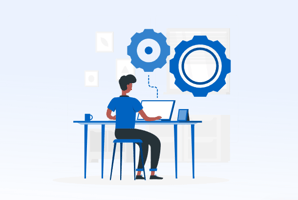Ember.js is a powerful and widely used JavaScript framework for building robust web applications....
Unleashing DevOps Potential: A Comprehensive Guide to Hiring DevOps Developers
In today's fast-paced world of information technology, where the speed of development and the reliability of products play a crucial role, DevOps has become an indispensable part of development teams. DevOps developers combine development and operational skills, enabling faster development cycles, improved system stability, and enhanced overall efficiency.
Hiring the right DevOps developers can make or break your organization's ability to adapt and thrive in this ever-evolving digital landscape. In this comprehensive guide, we will explore the key considerations, skills, and strategies for effectively hire DevOps developers.
Understanding the Role of a DevOps Developer
Before diving into the hiring process, it's essential to have a clear understanding of what a DevOps developer does. DevOps, which stands for Development and Operations, is a set of practices and tools that aim to automate and integrate the processes of software development and IT operations. DevOps developers are responsible for bridging the gap between development and operations teams, ensuring seamless collaboration, and streamlining the deployment and maintenance of software systems.
DevOps developers typically possess a unique skill set that includes:
-
Programming and Scripting: Proficiency in programming languages such as Python, Ruby, or Java, and scripting languages like Bash is crucial for automation and infrastructure management.
-
Containerization and Orchestration: Knowledge of containerization technologies like Docker and container orchestration platforms like Kubernetes.
-
Version Control: Expertise in version control systems like Git to manage code changes efficiently.
-
Continuous Integration/Continuous Deployment (CI/CD): Experience with CI/CD pipelines for automating software delivery processes.
-
Infrastructure as Code (IaC): Familiarity with tools like Terraform and Ansible to manage infrastructure programmatically.
-
Monitoring and Logging: Proficiency in tools like Prometheus, Grafana, ELK stack, or similar solutions to monitor and troubleshoot system performance.
-
Cloud Platforms: Knowledge of cloud platforms like AWS, Azure, or Google Cloud for infrastructure provisioning and management.
-
Security: Awareness of security best practices and the ability to implement security measures within DevOps processes.
Key Considerations When Hiring DevOps Developers
1. Define Your Needs
Start by clearly defining your organization's specific needs and goals. Consider factors such as the scale of your projects, technology stack, and existing infrastructure. Determine whether you require a DevOps developer with a focus on specific areas, such as cloud deployment, security, or automation.
2. Job Description
Craft a detailed job description that outlines the role's responsibilities, required skills, and expectations. Be sure to highlight the significance of DevOps in your organization and the impact the role will have on project success.
3. Screening and Interviewing
Implement a robust screening process that includes technical assessments and interviews. Assess candidates' programming skills, problem-solving abilities, and their familiarity with relevant tools and technologies.
4. Culture Fit
Consider the candidate's cultural fit within your organization. DevOps developers need to collaborate closely with both development and operations teams, so their ability to work well in a team is crucial.
5. Experience and Projects
Evaluate candidates based on their past experience and the projects they've worked on. Assess their ability to handle real-world scenarios and challenges.
6. Certifications
While not mandatory, certifications like AWS Certified DevOps Engineer or Kubernetes Certified Administrator can demonstrate a candidate's expertise.
7. Soft Skills
Don't overlook the importance of soft skills, such as communication, adaptability, and problem-solving abilities. DevOps developers often need to navigate complex challenges and communicate effectively across teams.
8. Compensation
Ensure that your compensation package is competitive, considering the demand for experienced DevOps developers. Keep in mind that attracting and retaining top talent may require competitive salaries and benefits.
Conclusion
Hiring DevOps developers is a strategic investment in the success of your software development projects. By understanding the role, defining your needs, and following a thoughtful hiring process, you can build a DevOps team that will drive efficiency, stability, and innovation within your organization. Make sure to continuously assess and adapt your hiring approach to meet the evolving demands of the digital landscape and stay ahead of the competition.


